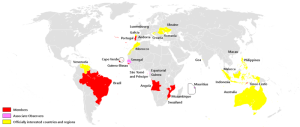Preface
The Portuguese Language and the Lusophone world

The Lusophone world refers to the global community of Portuguese-speaking people and countries. The term “Lusophone” is derived from the Portuguese word “Lusofonia,” which is used to describe the Portuguese-speaking world and its cultural and linguistic connections. According to the United Nations in 2021, “the Portuguese language is not only one of the most widespread languages in the world, with more than 265 million speakers spread across all continents, but it is also the most widely spoken language in the southern hemisphere.”
The Lusophone world encompasses a diverse range of countries and cultures, including Portugal, Brazil, Angola, Mozambique, Cape Verde, Guinea-Bissau, São Tomé and Principe, East Timor and others. Portuguese is the official language of these countries, and it is widely spoken as a first or second language by millions of people worldwide.
In addition to its cultural and linguistic connections, the Lusophone world is also united by a shared history and cultural heritage that dates back to the Portuguese Empire, which was one of the largest and most influential empires in the world during the Age of Discovery. Today, the Lusophone world is a vibrant and dynamic community that celebrates its diverse cultural heritage and works to promote Portuguese-language and cultural exchange globally.
Portuguese colonialism
Portuguese colonialism refers to the period of Portuguese history from the late 15th to the late 19th centuries, when Portugal established a vast overseas empire that included colonies and territories in Africa, Asia, and the Americas.
The Portuguese began exploring and establishing colonies in the late 15th century, driven by a desire for trade, resources, and new markets. Portugal was one of the first European powers to establish a significant overseas empire, and it held colonies in Brazil, Angola, Mozambique, India, Indonesia, and many other territories around the world.
Portuguese colonialism had a lasting impact on the world. The Portuguese Empire played a significant role in the global economy and in the exchange of goods, people, and ideas between Europe and the rest of the world. The Portuguese also brought their culture, religion, and language to their colonies, and Portuguese colonial influence can still be seen in many countries around the world today.
However, Portuguese colonialism also had negative consequences. Portuguese colonial rule was often brutal and exploitative, and many colonial territories were stripped of their resources and wealth. Indigenous populations were often subjected to forced labor and enslavement, and the Portuguese brought diseases and other environmental impacts that had devastating effects on local populations.
Except for Brazil, who became independent from Portugal in 1822, and Macau, who went back under China’s control in 1999, most Portuguese colonies gained independence in the 20th century. Lusophone territories in Africa became independent in 1974 and 1975, with Guinea Bissau declaring independence in 1963. Portugal itself underwent significant political and economic changes in the 20th century, first with Salazar’s regime, and later, with the Carnation Revolution. Today, the legacy of Portuguese colonialism remains a controversial and complex issue, and its impact continues to shape the political, economic, and cultural landscape of the countries it once ruled.
Celebrating the Portuguese Language
Each year, on May 5th, all Lusophone countries, their diplomatic representations worldwide and teachers of Portuguese celebrate what has become known as World Portuguese Language Day (Dia da Língua Portuguesa). According to the United Nations, “the date of May 5th was officially established in 2009 by the Community of Portuguese Speaking Countries (CPLP) – an intergovernmental organization, an official partner of UNESCO since 2000, which brings together peoples who have the Portuguese language as one of the foundations of their specific identity. – to celebrate the Portuguese language and Lusophone cultures.”
The following video shows the speech given by Mr. António Guterres, Secretary-General of the United Nations on May 5, 2021, in celebration of the Dia da Língua Portuguesa.
